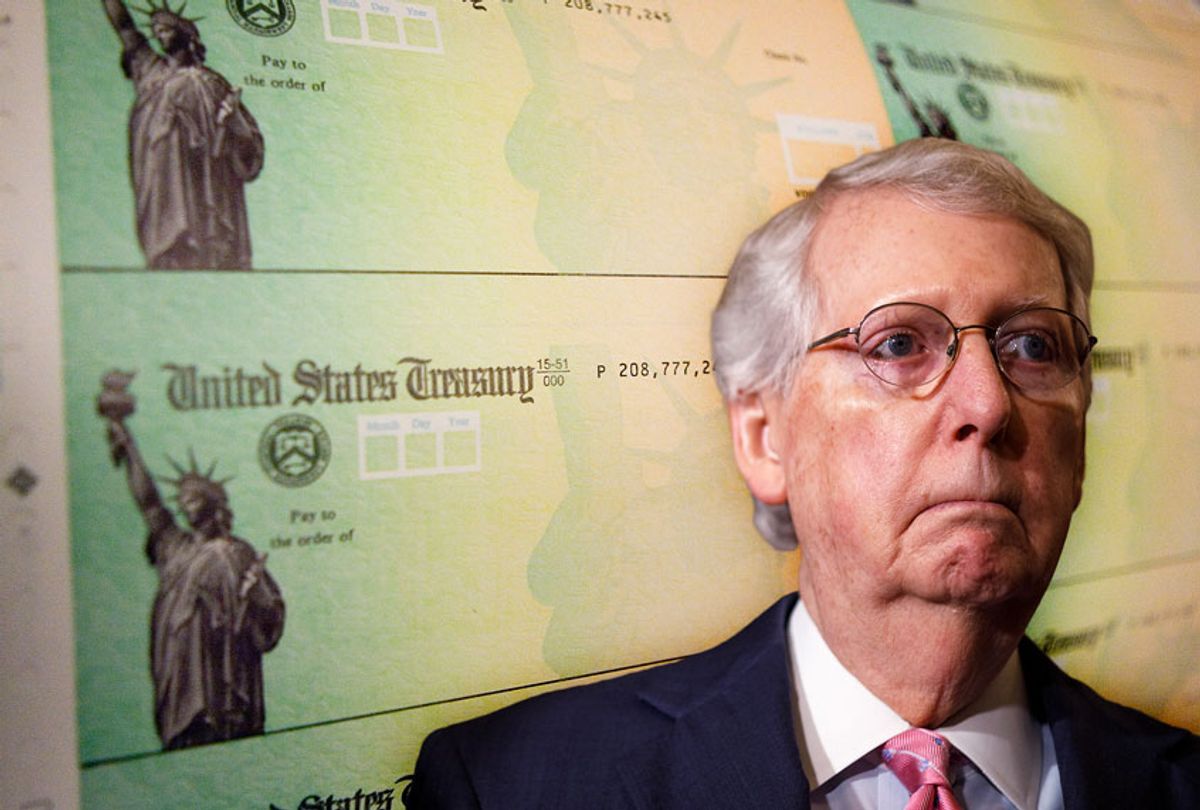The $600 weekly boost in unemployment benefits that more than 30 million laid-off Americans are relying on to endure the coronavirus-induced recession is set to expire in just 10 days without action from Congress—but Republican Senate Majority Leader Mitch McConnell appears to be in no hurry to negotiate a solution.
With the Senate currently on recess and not expected to return until July 20, McConnell told reporters Monday that he doesn't plan to begin formal stimulus talks with his Democratic counterparts until next week at the earliest. Senate Minority Leader Chuck Schumer (D-N.Y.) reportedly told his caucus Tuesday that he has not heard from McConnell regarding Covid-19 negotiations.
McConnell's timeline for the talks would leave the Senate and House with less than a week to hash out and pass legislation before unemployment benefits begin reverting to their pre-pandemic rate, which in some states maxes out at less than $300 per week.
"Mitch McConnell may already have doomed the tens of millions of American workers who depend on enhanced federal unemployment benefits to a sudden, sharp decline in income at the end of July," Rep. Don Beyer (D-Va.) said in a statement late Tuesday.
"Because state unemployment benefits need to be extended by July 25 in order to be processed by states administering their programs, McConnell's announcement that the Senate will not even begin drafting or negotiating legislation until next week effectively makes a lapse in those expanded payments unavoidable," Beyer added. "We may already be out of time to avoid the iceberg."
xx
Economists have repeatedly warned that allowing the enhanced unemployment benefits to expire at the end of July would slash the incomes of more than 30 million Americans by 50-75%. According to Josh Bivens of the Economic Policy Institute, such a steep income cut could also cause massive job losses and a decline in economic growth.
Sen. Ron Wyden (D-Ore.), one of the architects of the boosted unemployment insurance, tweeted Wednesday that "30 million Americans will be left in the lurch without this critical lifeline."
"It's time for the Trump administration and Senate Republicans to get their act together and extend supercharged unemployment benefits," said Wyden. "Our whole economy depends on it."
The Democrat-controlled House of Representatives passed a bill in May that would extend the $600 weekly unemployment insurance boost through January of next year, but McConnell has refused to allow a vote on the legislation.
After previously opposing any extension of the enhanced unemployment insurance, Trump administration officials in recent days have signaled openness to approving smaller weekly payments.
"Despite some new consensus that the additional $600 in federal unemployment benefits shouldn't disappear entirely, Republicans and Democrats are still far apart on an actual deal," HuffPost reported Wednesday. "Republicans are looking at a number closer to $200, and Democrats are pushing for benefits closer to $500."
Though the program got off to a rough start as an unprecedented flood of unemployment applications created massive backlogs and delays, the enhanced benefits have been lauded by progressives as on the whole one of the most successful components of the federal government's Covid-19 response.
Supporters of the program argue it would be catastrophic to let the benefits to expire as coronavirus infections surge across the U.S., thousands of workers are laid off for a second time as states roll back their reopenings, and tens of millions of Americans face possible eviction.
"This is the real fiscal cliff," tweeted Bharat Ramamurti, a member of the congressional committee tasked with overseeing the Trump administration's handling of Covid-19 funds.
In less than two weeks, Ramamurti said, "30+ million will experience huge cuts in income—a shock that will force such an enormous drop in consumer spending that it will cause 3 million further job losses."
George Wentworth, senior counsel at the National Employment Law Project, told The American Prospect Monday that "with the virus still not under control and more states reinstating Covid-related restrictions on many sectors of the economy, health and economic conditions are still far too volatile to end this supplement."
"Now is not the time to pull the rug out from under workers who are not able to return to work because of the damage done by the pandemic," said Wentworth.



Shares